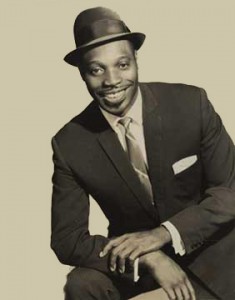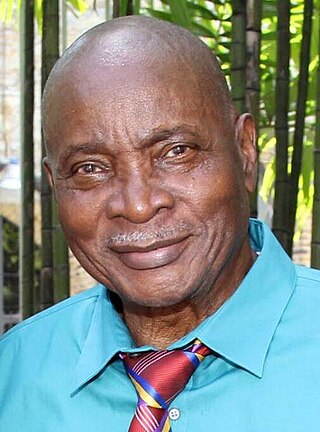Related Research Articles
Soca music is a genre of music defined by Lord Shorty, its inventor, as the "Soul of Calypso", which has influences of African and East Indian rhythms. It was originally spelled "sokah" by its inventor but through an error in a local newspaper when reporting on the new music it was erroneously spelled "soca"; Lord Shorty confirmed the error but chose to leave it that way to avoid confusion. It is a genre of music that originated in Trinidad and Tobago in the early 1970s and developed into a range of styles during the 1980s and after. Soca was initially developed by Lord Shorty in an effort to revive traditional calypso, the popularity of which had been flagging amongst younger generations in Trinidad due to the rise in popularity of reggae from Jamaica and soul and funk from the United States. Soca is an offshoot of Calypso/Kaiso, with influences from East Indian rhythms and hooks.
Calypso is a style of Caribbean music that originated in Trinidad and Tobago during the early to the mid-19th century and spread to the rest of the Caribbean Antilles by the mid-20th century. Its rhythms can be traced back to West African Kaiso and the arrival of French planters and their slaves from the French Antilles in the 18th century.

Aldwyn Roberts HBM DA, better known by the stage name Lord Kitchener, was a Trinidadian calypsonian. He has been described as "the grand master of calypso" and "the greatest calypsonian of the post-war age".

Slinger Francisco ORTT CM OBE, better known as Mighty Sparrow, is a Trinidadian calypso vocalist, songwriter, and guitarist. Known as the "Calypso King of the World", he is one of the best-known and most successful calypsonians. He has won Trinidad's Carnival Road March competition eight times, Calypso King/Monarch eight times, and has twice won the Calypso King of Kings title.
The music of Trinidad and Tobago is best known for its calypso music, soca music, chutney music, and steelpan. Calypso's internationally noted performances in the 1950s from native artists such as Lord Melody, Lord Kitchener and Mighty Sparrow. The art form was most popularised at that time by Harry Belafonte. Along with folk songs and African- and Indian-based classical forms, cross-cultural interactions have produced other indigenous forms of music including soca, rapso, parang, chutney, and other derivative and fusion styles. There are also local communities which practice and experiment with international classical and pop music, often fusing them with local steelpan instruments.

A calypsonian, originally known as a chantwell, is a musician from the anglophone Caribbean who sings songs of the calypso genre.
The music of the Lesser Antilles encompasses the music of this chain of small islands making up the eastern and southern portion of the West Indies. Lesser Antillean music is part of the broader category of Caribbean music; much of the folk and popular music is also a part of the Afro-American musical complex, being a mixture of African, European and indigenous American elements. The Lesser Antilles' musical cultures are largely based on the music of African slaves brought by European traders and colonizers. The African musical elements are a hybrid of instruments and styles from numerous West African tribes, while the European slaveholders added their own musics into the mix, as did immigrants from India. In many ways, the Lesser Antilles can be musically divided based on which nation colonized them.
"Forged from the Love of Liberty" is the national anthem of the Trinidad and Tobago. Originally composed as the national anthem for the short-lived West Indies Federation (1958–1962), this song was edited and adopted by Trinidad and Tobago when it became independent in 1962. It was written and composed by Patrick S. Castagne.
Samuel L. Manning was a Trinidadian performer and songwriter who was one of the earliest calypsonians to achieve international acclaim.
David Michael Rudder OCC is a Trinidadian calypsonian, known to be one of the most successful calypsonians of all time. He performed as lead singer for the brass band Charlie's Roots. Nine years later, Rudder stepped outside the band, entering the calypso tent as a solo calypsonian in 1986, which was followed by an unprecedented rise to fame.

Anslem Douglas is a Trinidadian musician and composer. He is best known for the hit single "Doggie", which was later covered by the Bahamian junkanoo band Baha Men as "Who Let the Dogs Out".

Destra Garcia is a Trinidadian musician, singer and songwriter of soca music. She is also known by the mononym Destra. She is one of the most popular female soca artists in the world.
The Southern Caribbean is a group of islands that neighbor mainland South America in the West Indies. Saint Lucia lies to the north of the region, Barbados in the east, Trinidad and Tobago at its southernmost point, and Aruba at the most westerly section.
Trinidadian and Tobagonian British people are citizens or residents of the United Kingdom whose ethnic origins lie fully or partially in Trinidad and Tobago.

Barbados and Trinidad and Tobago formally established diplomatic relations on Barbados' national date of independence, 30 November 1966. Barbados maintains non-resident representation to Port of Spain, and the Republic of Trinidad and Tobago maintains non-resident representation to Bridgetown. Both countries are members of many shared organisations, including the Association of Caribbean States, the Commonwealth of Nations, CARICOM, CARIFORUM, and the Community of Latin American and Caribbean States.

"In Plenty and In Time of Need" is the national anthem of the country of Barbados. It was written by Irving Burgie and was composed by C. Van Roland Edwards. As one part of the West Indies Federation from 1958 to 1962, Barbados' anthem was supposed to be "Forged from the Love of Liberty", however the current anthem was created with Barbados's moves toward full independence. The song was then adopted by Barbados when it became independent in 1966.
Kade Simon, better known as Lord Brynner, was a Trinidadian calypsonian who won the Trinidad and Tobago Independence Calypso Contest in 1962. He also had a number of Ska hits in Jamaica during the mid-1960s.
Adolf Hitler is a calypso written and performed by Clifford Morris, better known as the Mighty Destroyer, winning the Calypso King competition at the Trinidad and Tobago Carnival of 1941, the last one before the end of World War II due to the danger of German submarine attacks in the Caribbean.

Winsford Devine, known by the sobriquet Joker, was a Trinidad and Tobago songwriter who composed over 500 calypsos. He worked with The Mighty Sparrow for 17 years, writing many of Sparrow's hits including Slave, Philip, My Dear, and Marajhin. Devine was also the composer of Progress which has been ranked among the best calypsos ever.
Clifton Ryan, better known as the Mighty Bomber, was a Grenadian-born calypsonian from Trinidad and Tobago.
References
- ↑ "No. 42876". The London Gazette (Supplement). 28 December 1962. p. 1.
- ↑ Joseph, Terry. "Pat Castagne 1916-200"". Trinbagopan.com.